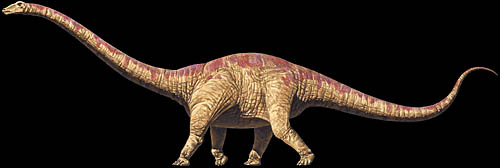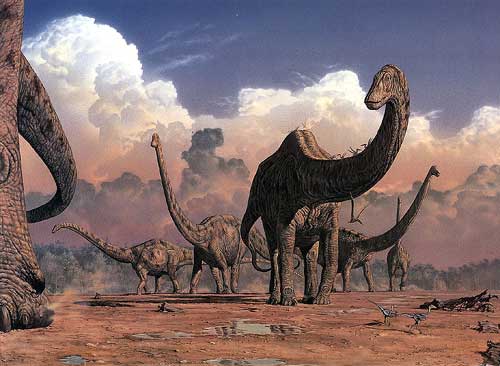Seismosaurus halli - Heribivore Dinosaurs
Homepage > Herbivore Dinosaurs - Seismosaurus halli
(size-moe-sor-uhss)
"Earthquake lizard"
Describer
Also Known As --
Type of Species
Order Saurischia
SubOrder Sauropodomorpha
InfraOrder Sauropoda
Micro-Order --
Family Diplodocidae
Size 135 feet (41 meters) long
Period Late Jurassic, 156 million years ago
Fossilsite New Mexico, USA
Diet Herbivore
Seismosaurus lived during the Late Jurassic Period, 156 million years ago in what is now New Mexico, US. Seismosaurus was without a doubt, one of the largest animals ever to walk the Earth. It measured half a football field in length, is the longest dinosaur to date. It is believed that this dinosaur may have lived in herds, but until more evidence is found, such as fossilized foot prints or several skeletons in the same place, this is just a speculation.
So far, paleontologist have only found one Seismosaurus skeleton, but a lot has been learned from it. This skeleton was more or less complete. When scientists uncovered the remains of the creatures's stomach area they gathered a pile of about 250 gastroliths. Most of these stones were about 2 inches in diameter and aided this large herbivore by crushing plant material into a pulp.
Seismosaurus had nostrils on top of its head. It had a small head, and peg-like teeth sitting in front of its jaws. Its forelimbs were shorter than its hindlimbs. Its feet had five toes, and one of these was a thumb clawed. It had a long wip-like tail which may have been used to lash out at a predator with. Seismosaurus was a long neck dinosaur, bigger even than its close relative, Diplodocus. Other giants among the giants were Supersaurus and Amphicoelias of the Colorado Morrison Formation. This two and Seismosaurus are of the very slender type and have not been absolutely distinguished from Diplodocus and Barosaurus.
Seismosaurus halli Paleo Gallery
Click on images to see more art from artist!

